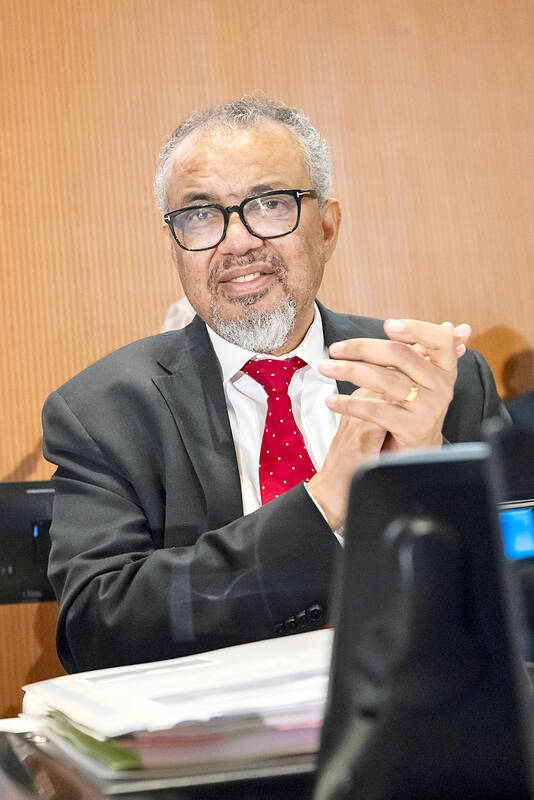The World Health Assembly yesterday adopted a landmark pandemic agreement on tackling future health crises, struck after more than three years of negotiations sparked by the COVID-19 crisis.
The accord aims to prevent the disjointed response and international disarray that surrounded the COVID-19 pandemic by improving global coordination and surveillance, and access to vaccines, in any future pandemics.
The WHO’s decisionmaking annual assembly adopted the plan at its Geneva headquarters.

Photo: EPA-EFE
“It’s an historic day,” WHO Director-General Tedros Adhanom Ghebreyesus said after the vote.
The text of the agreement was finalized by consensus last month, following multiple rounds of tense negotiations.
The US pulled out of those talks, following President Donald Trump’s decision to withdraw his country from the WHO, a process that takes one year to complete.
“The world is safer today thanks to the leadership, collaboration and commitment of our member states to adopt the historic WHO Pandemic Agreement,” Tedros said in a statement.
“The agreement is a victory for public health, science and multilateral action. It will ensure we, collectively, can better protect the world from future pandemic threats,” he said.
“It is also a recognition by the international community that our citizens, societies and economies must not be left vulnerable to again suffer losses like those endured during COVID-19,” he said.
The treaty faced a late challenge on Monday when Slovakia called for a vote, as its COVID-19 vaccine-skeptic prime minister demanded that his country challenge the adoption of the agreement.
A total of 124 countries voted in favor, no countries voted against, while 11 countries, including Poland, Israel, Italy, Russia, Slovakia and Iran, abstained.
The agreement aims to better detect and combat pandemics by focusing on greater international coordination and surveillance, and more equitable access to vaccines and treatments.
The negotiations grew tense amid disagreements between wealthy and developing countries, with the latter feeling cut off from access to vaccines during the COVID-19 pandemic.
The agreement faced opposition from those who thought it would encroach on state sovereignty.
Nations have until May next year to thrash out the details of the agreement’s Pathogen Access and Benefit-Sharing (PABS) mechanism.
The PABS mechanism deals with sharing access to pathogens with pandemic potential, and then sharing of benefits derived from them: vaccines, tests and treatments.
Once the PABS system is finalized, the agreement can then be ratified. Sixty ratifications are required for the treaty to enter into force.
Precious Matsoso of South Africa and French Ambassador for Global Health Anne-Claire Amprou cochaired the talks process that led to the agreement.
“It is intended to create a rules-based, future-proof system that will stand the test of time. It does not, and will not, undermine the sovereignty of countries,” Matsoso told the assembly on Monday.
“In a time of growing geopolitical tensions and seismic changes, this agreement is proof that the world is still together,” she added.
Additional reporting by Reuters

VAGUE: The criteria of the amnesty remain unclear, but it would cover political violence from 1999 to today, and those convicted of murder or drug trafficking would not qualify Venezuelan Acting President Delcy Rodriguez on Friday announced an amnesty bill that could lead to the release of hundreds of prisoners, including opposition leaders, journalists and human rights activists detained for political reasons. The measure had long been sought by the US-backed opposition. It is the latest concession Rodriguez has made since taking the reins of the country on Jan. 3 after the brazen seizure of then-Venezuelan president Nicolas Maduro. Rodriguez told a gathering of justices, magistrates, ministers, military brass and other government leaders that the ruling party-controlled Venezuelan National Assembly would take up the bill with urgency. Rodriguez also announced the shutdown

Civil society leaders and members of a left-wing coalition yesterday filed impeachment complaints against Philippine Vice President Sara Duterte, restarting a process sidelined by the Supreme Court last year. Both cases accuse Duterte of misusing public funds during her term as education secretary, while one revives allegations that she threatened to assassinate former ally Philippine President Ferdinand Marcos Jr. The filings come on the same day that a committee in the House of Representatives was to begin hearings into impeachment complaints against Marcos, accused of corruption tied to a spiraling scandal over bogus flood control projects. Under the constitution, an impeachment by the

Exiled Tibetans began a unique global election yesterday for a government representing a homeland many have never seen, as part of a democratic exercise voters say carries great weight. From red-robed Buddhist monks in the snowy Himalayas, to political exiles in megacities across South Asia, to refugees in Australia, Europe and North America, voting takes place in 27 countries — but not China. “Elections ... show that the struggle for Tibet’s freedom and independence continues from generation to generation,” said candidate Gyaltsen Chokye, 33, who is based in the Indian hill-town of Dharamsala, headquarters of the government-in-exile, the Central Tibetan Administration (CTA). It

China executed 11 people linked to Myanmar criminal gangs, including “key members” of telecom scam operations, state media reported yesterday, as Beijing toughens its response to the sprawling, transnational industry. Fraud compounds where scammers lure Internet users into fake romantic relationships and cryptocurrency investments have flourished across Southeast Asia, including in Myanmar. Initially largely targeting Chinese speakers, the criminal groups behind the compounds have expanded operations into multiple languages to steal from victims around the world. Those conducting the scams are sometimes willing con artists, and other times trafficked foreign nationals forced to work. In the past few years, Beijing has stepped up cooperation